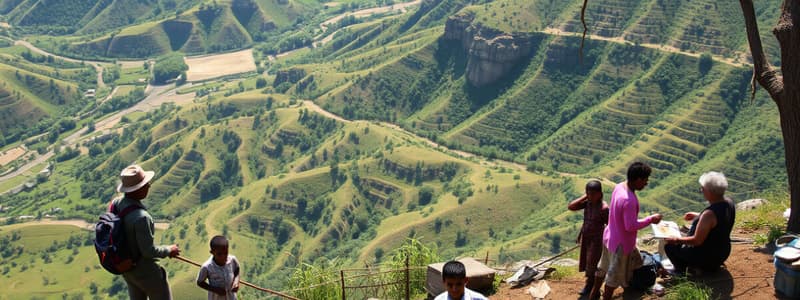Podcast
Questions and Answers
What does the term 'geography' specifically mean based on its Greek roots?
What does the term 'geography' specifically mean based on its Greek roots?
- Mapping the heavens
- Study of human interactions
- Science of landscapes
- Earth writings (correct)
Which civilization first systematized the study of geography into a logical body of knowledge?
Which civilization first systematized the study of geography into a logical body of knowledge?
- Greek civilization (correct)
- Indus Valley civilization
- Roman civilization
- Chinese civilization
During which period did geography become less prominent in Europe?
During which period did geography become less prominent in Europe?
- Industrial Revolution
- Middle Ages (correct)
- Renaissance
- Iron Age
What was one of the advancements made during the Islamic Golden Age related to geography?
What was one of the advancements made during the Islamic Golden Age related to geography?
Which sub-field of geography focuses specifically on Earth's natural features and climate patterns?
Which sub-field of geography focuses specifically on Earth's natural features and climate patterns?
What is the primary focus of human-environment geography?
What is the primary focus of human-environment geography?
Which of the following pairs correctly identifies a collaboration in human-environment geography?
Which of the following pairs correctly identifies a collaboration in human-environment geography?
In which year did the modern academic structure of geography begin to crystallize?
In which year did the modern academic structure of geography begin to crystallize?
Which technique is primarily used by geographers to analyze spatial data?
Which technique is primarily used by geographers to analyze spatial data?
What dynamic process is represented in the concept of 'Human → Traveling/Migrating → New environment → Adaptation'?
What dynamic process is represented in the concept of 'Human → Traveling/Migrating → New environment → Adaptation'?
Study Notes
Geography Overview
- Eratosthenes, a Greek scholar, coined the term "geography" in the 3rd century BCE, combining "geo-" (earth) and "-graphy" (to write).
- Geography examines the locations and interactions between humans and their environments.
- The Greeks first organized geography into a coherent body of knowledge, essential for human understanding since ancient times.
Historical Development
- During the Middle Ages, geography received less emphasis in Europe.
- The Islamic Golden Age saw advancements in geography, including the creation of comprehensive mapping systems.
- Islamic scholars identified animals and crops that adapted well to various environments.
- The Chinese were pioneers in using the compass for navigation.
Sub-fields of Geography
-
Physical Geography
- Also known as biophysical phenomena.
- Focuses on Earth's natural features and processes.
- Studies include climatology (climate patterns), biogeography (plant and animal distribution), and geomorphology (landform evolution).
-
Human Geography
- Also known as social phenomena.
- Examines human activities' patterns and dynamics affecting landscapes.
- Areas of study include cultural geography, health geography, economic geography, historical geography, and political geography.
Human-Environment Geography
- Central to geography; investigates relationships between nature and society.
- The discipline has its roots in 19th-century Germany, highlighting its academic significance.
- Human-environment geographers collaborate across various fields:
- Political ecologists work with anthropologists and development practitioners.
- Hazards geographers team up with geologists and disaster relief experts.
- Water resource geographers partner with hydrologists and watershed managers.
Techniques in Human-Environment Geography
- Geography uses advanced techniques for spatial data presentation and manipulation, notably cartography.
- Geographic Information Systems (GIS) analyze relationships such as population density versus soil fertility.
- Remote sensing employs aerial photography and satellite imagery to monitor surface biomass changes over time.
Human Adaptation
- As humans migrate and travel to new environments, adaptation becomes essential.
- The dynamic nature of environments raises questions about maintaining individuality amidst change.
Studying That Suits You
Use AI to generate personalized quizzes and flashcards to suit your learning preferences.
Description
This quiz explores the fundamental concepts of human-environment interaction from a geographic perspective. It highlights the historical context of geography and the essential relationships between humans and their surroundings. Test your knowledge about the key terms and ideas in this vital area of study.




